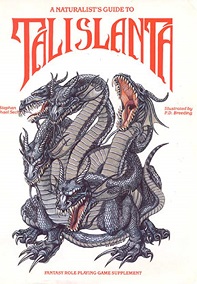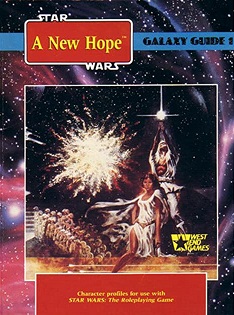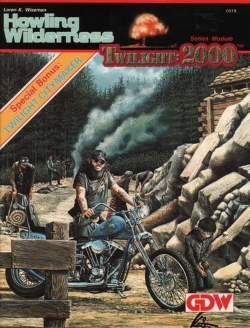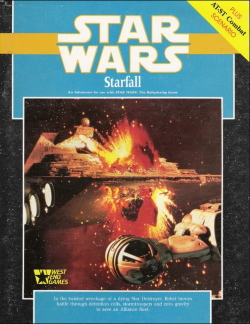West End Games (WEG) was a company that made board, role-playing, and war games. It was founded by Daniel Scott Palter in 1974 in New York City, but later moved to Honesdale, Pennsylvania. Its product lines included Star Wars, Paranoia, Torg, DC Universe, and Junta.

Chill is an investigative and modern horror role-playing game originally published by Pacesetter Ltd in 1984 that captures the feel of 20th-century horror films.

Torg is a cinematic cross-genre tabletop role-playing game created by Greg Gorden and Bill Slavicsek, with art by Daniel Horne. It was first published by West End Games (WEG) in 1990. Game resolution uses a single twenty-sided die, drama cards and a logarithmic results table, which later formed the basis for WEG's 1992 sci-fi RPG Shatterzone and 1994 universal RPG Masterbook. WEG produced over fifty supplements, novels and comics for the first edition. A revised and expanded core rule book was produced in 2005, with a single adventure.
Christopher Kubasik, also known as Chris Kubasik, is an American author of several role-playing games, sourcebooks, adventures and fiction novels set in them, and has created his own TV series.
Jim Bambra is a British designer and reviewer of fantasy roleplaying games (RPG), and a former company director. He is particularly known for his contributions to Dungeons & Dragons, Fighting Fantasy, Warhammer, and Star Wars: The Roleplaying Game which was based on the Star Wars films. Later he became head of design at MicroProse, then managing director of Pivotal Games, a publisher of video games including Conflict: Desert Storm.
Ross Watson is a designer of computer, miniature and role-playing games and a writer in various genres. Watson worked on the Warhammer 40,000 Roleplay line as the Lead Developer for Dark Heresy, was the lead designer for Rogue Trader and Deathwatch, and was part of the design team for Black Crusade. He was the lead developer for both Aaron Allston's Strike Force and Savage Worlds Rifts. His written works include the Accursed and Weird War I settings for Savage Worlds, contributions to the Star Wars: Edge of the Empire RPG, and the video games Darksiders II, Warhammer 40,000: Regicide, and Battlefleet Gothic: Armada. Watson has designed rules and scenarios for miniature game lines, such as Dust Warfare, and he has written for several card games, including Warhammer: Invasion, Empire Engine, and the Lost Legacy series.

The Chronicles of Talislanta is a supplement published by Bard Games in 1987 for the fantasy role-playing game Talislanta.

A Naturalist's Guide to Talislanta is a supplement published by Bard Games in 1987 for the fantasy role-playing game Talislanta.

Talislanta Sorcerer's Guide is a supplement published by Bard Games in 1988 for the fantasy role-playing game Talislanta.

Battle for the Golden Sun is an adventure published by West End Games in 1988 for the science fiction role-playing game Star Wars: The Roleplaying Game.

Creatures of Orrorsh is a supplement published by West End Games in 1992 for the multi-genre role-playing game Torg.

Galaxy Guide 1: A New Hope is a supplement published by West End Games in 1989 for Star Wars: The Roleplaying Game, which is based on Star Wars.

Galaxy Guide 2: Yavin and Bespin is a supplement published by West End Games in 1989 for the science fiction role-playing game Star Wars: The Roleplaying Game, which itself is based on Star Wars.

Howling Wilderness is a 1988 Post apocalyptic military tabletop role-playing game supplement for Twilight: 2000 published by Game Designers' Workshop.

Star Trek: The Next Generation Officer's Manual is a supplement published by FASA in 1988 for Star Trek: The Role Playing Game to update game material following the premiere of the new television series Star Trek: The Next Generation. However Paramount Pictures did not feel FASA's new material matched the ethos of the new series, and pulled FASA's license to produce Star Trek material the following year.

Starfall is a role-playing adventure published by West End Games in 1989 for Star Wars: The Roleplaying Game, which itself is based on Star Wars.
Tobin's Spirit Guide is a 1989 role-playing game supplement published by West End Games for Ghostbusters, which is based on the popular movie Ghostbusters.

The Nile Empire is a supplement published by West End Games in 1990 for the cross-genre role-playing game Torg. A second edition was published for the Torg Eternity RPG in 2020.

The Destiny Map is an adventure published by West End Games in 1990 for the cross-genre role-playing game Torg.

The Possibility Chalice is the second of three adventures in the Relics of Power trilogy published by West End Games (WEG) in 1990 for the cross-genre role-playing game Torg.
















